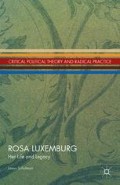Abstract
Somewhere in the past 25 years, Rosa Luxemburg, once a “revolutionary for our times,” became a liberal. The precise date of that transmogrification is unknown, but its discovery was announced with little advance fanfare, but with much subsequent consternation in the Summer 2001 and Winter 2001–2002 issues of New Politics. In making his case, Stephen brought to bear, with the typical erudition, clarity of presentation and impish wit that makes his fortunate students the envy of his political audience, the full weight of critical Marxism, the Marxism of Georg Lukács and of Karl Korsch. All of which is even more dazzling, given that the latter are, at least to this untutored mind, more often associated with ultra-leftism than with Social Democracy. So, in effect, Stephen performed the audacious tandem mental trapeze act of having inverted Left and Right not only in the person of Rosa Luxemburg, but of the entire socialist analytical continuum as well.
Keep your anachronistic notions of national self-determination and workers’ councils. Keep your irrelevant view of “science.” Keep your insular beliefs. But then when you glance at the world, perhaps you will consider everything as simply “false consciousness?” Was everyone an idiot except your “tiny minority,” who still knows everything better, but to whom no one ever listens?
—Stephen E. Bronner, 2002
From the traditional perspective these unactualized possi-bilities and unrealized potentialities for liberation come to be seen as “irrational.” Consequently, they can be dismissed— but always in the name of the present that has become manifest. In the name of the status quo, the relative validity of unactualized needs and demands that were expressed both in theory and praxis are brushed aside, and termed “impossible to achieve.”
—Stephen E. Bronner, 1987
For, just as materialism itself originally grew out of the critique of religion, so too must the mystification of capitalist ideology and production relations—the most progressive aspects of which cannot be actualized within capitalist society and the most reactionary of which simply serve to veil the functioning of the given order—be criticized in a concrete manner and in terms of the concrete alternative of workers’ control that is, after all, the basis of emancipatory socialism. —Stephen E. Bronner, 1977–78
Access this chapter
Tax calculation will be finalised at checkout
Purchases are for personal use only
Preview
Unable to display preview. Download preview PDF.
Editor information
Copyright information
© 2013 Jason Schulman
About this chapter
Cite this chapter
Finger, B. (2013). Rosa Redux Ad Absurdum. In: Schulman, J. (eds) Rosa Luxemburg. Critical Political Theory and Radical Practice. Palgrave Macmillan, New York. https://doi.org/10.1057/9781137343321_8
Download citation
DOI: https://doi.org/10.1057/9781137343321_8
Publisher Name: Palgrave Macmillan, New York
Print ISBN: 978-1-349-46810-2
Online ISBN: 978-1-137-34332-1
eBook Packages: Palgrave Political & Intern. Studies CollectionPolitical Science and International Studies (R0)

